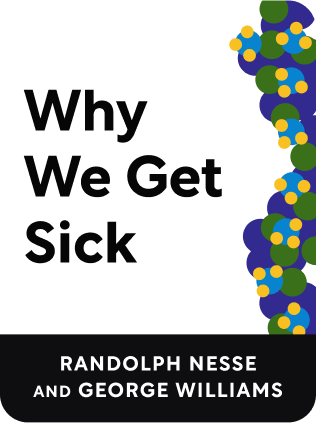

This article is an excerpt from the Shortform book guide to "Why We Get Sick" by Randolph Nesse and George Williams. Shortform has the world's best summaries and analyses of books you should be reading.
Like this article? Sign up for a free trial here .
Why hasn’t evolution prevented sickness and disease? How can Darwinian medicine explain why we get sick?
The reason we still get sickness and disease despite evolution is that the body must make careful compromises. Sometimes, the thing that causes a disease is or was helpful to us at some point in time.
Continue reading to learn why we get sick despite evolutionary advances.
Why Haven’t We Evolved Disease Away?
After millions of years of evolution, why do our bodies still seem so flawed? Why do we get sick at all? Why hasn’t natural selection prevented heart attacks, nearsightedness, and Alzheimer’s disease?
The common answer is that “natural selection isn’t powerful enough to get rid of disease.” This is usually the wrong idea.
Instead, it’s important to realize that the body is a bundle of careful compromises. The reason we have diseases today is that the very things that cause disease were helpful for us at one point, or are still helpful for us in certain situations. In this way, evolutionary medicine seeks to understand why we have disease.
In thinking about disease, it’s important to distinguish between proximate causes and evolutionary causes of disease.
Proximate and Evolutionary Causes of Sickness
- Proximate questions ask “what caused the disease? How did the disease start and progress?” For heart attacks, the proximate cause is atherosclerosis, and its associated causes like high blood pressure and cholesterol.
- Evolutionary questions ask, “why hasn’t natural selection eliminated the genes that lead to heart disease? Why hasn’t it eliminated our craving for fatty foods and for overeating?”
In Darwinian medicine, evolutionary explanations of disease require explaining more than just the current function – they should explain aspects of the evolutionary adaptation that leads to the disease:
- how the adaptation gives an advantage
- why lacking this adaptation causes a disadvantage
- what was gradually shaped by natural selection to arrive at the current form
Evolutionary medicine is not just philosophizing. It’s also useful in predicting what to expect when treating disease. For example, infections usually cause low iron levels. The proximate viewpoint would suggest that giving iron as a treatment is an obvious choice. However, the evolutionary viewpoint would question, “is lower iron perhaps a defense against infection? Perhaps the body has adapted to lower iron during an infection, because it helps fight the infection? If this is true, wouldn’t giving iron actually worsen the infection?”
Reasons We Get Sick
This still doesn’t completely answer the question. If natural selection is so powerful, then why do we still get sick? There are a range of causes:
- Defenses confused as disease
- Many defenses during disease seem like diseases themselves. A common one is a cough, which is often confused as a cause of disease, when it’s actually a defense mechanism.
- If you incorrectly believe a defense is a disease and you treat it, you can cause catastrophic damage.
- Infection
- These are external agents like bacteria and viruses that cause disease. We’ve adapted defenses to them, but they continuously adapt to our defenses. It’s an ever-lasting arms race.
- Novel environments
- We evolved over millions of years living in small hunter-gatherer tribes on the plains of Africa. Today, we live in a world of constantly available food, cars, dense cities, and artificial lights. Our bodies did not evolve for this environment, and these new environments can cause diseases that were uncommon in our prehistoric past.
- Genes
- Genes that cause severe damage are selected against by natural selection. Therefore, defective genes with no compensating benefit are usually not a common cause of disease.
- Many genes confer a benefit in a more natural environment but now cause disease in today’s modern novel environment. For example, genes that predispose to heart disease were likely once useful when humans could barely scavenge enough to eat, but they’re harmful in today’s age.
- Design compromises
- A disease-causing gene viewed in isolation may seem like an odd weakness, but this ignores the bigger picture of how there might be coinciding benefits. Walking upright tends to cause back problems, but it allowed humans to carry food and babies.
- Evolutionary legacies
- Evolution is incremental and path-dependent, meaning some setups are legacies from previous evolution. For example, the esophagus and trachea have the same orifice input, which predisposes people to choking.

———End of Preview———
Like what you just read? Read the rest of the world's best book summary and analysis of Randolph Nesse and George Williams's "Why We Get Sick" at Shortform .
Here's what you'll find in our full Why We Get Sick summary :
- Why evolution hasn't rid humans of all diseases
- How reproductive fitness is more important than overall survival
- How you evolved to dislike the sound of a baby crying






